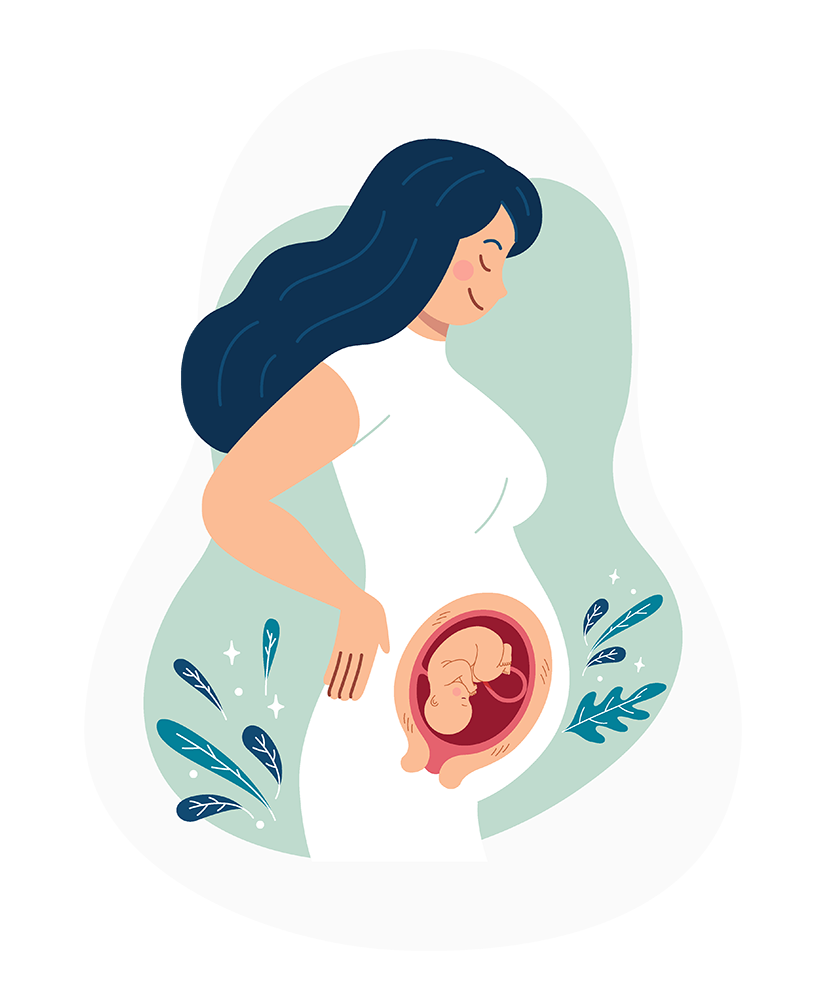
PREGNANCY
Month Seven (28 to 31 weeks)
Welcome to the exciting final stretch of your pregnancy—the third trimester! From weeks 28 to 40, you're getting closer and closer to meeting your little one, and the anticipation is real. This phase might throw some physical and emotional challenges your way, but it's all part of the incredible journey you're on. Your baby's growth might make it a bit tricky to get comfy, but each discomfort is a reminder of the amazing process happening inside you. With the end in sight, every day brings you closer to holding your baby in your arms. So, whether you're feeling tired, worried, or bursting with excitement, know that you're on the brink of something truly incredible. Get ready to welcome your bundle of joy with open arms—the countdown is on!
How is your baby developing?
At around 16 inches in length and weighing between 2.5 and 3.0 pounds (1100 to 1400 grams), your baby is steadily growing and thriving within the womb. While their organs have developed fully, they still require a few more months to reach full maturity. Remarkably, at this stage, approximately 90% of prematurely born babies have a strong chance of survival. Your baby's active movements serve to strengthen their limbs and promote healthy circulation. Senses are awakening, allowing them to perceive light changes and sounds within the womb. Meanwhile, their developing brain cells are wrapping themselves in a protective myelin sheath, and their tiny lungs are secreting surfactant to prevent collapse. To support their continued growth, ensure your diet includes foods rich in essential fatty acids (EFAs) as their body fat production increases. Your baby's journey towards birth is marked by remarkable developments, showcasing the wonders of God’s intricate design.


What are the changes happening to you?
Emotional and Hormonal
During the seventh month of pregnancy, expectant mothers may undergo notable emotional and hormonal changes. As the anticipation of childbirth grows more palpable, feelings of excitement, joy, and anxiety may intensify. Hormonally, fluctuations continue, with estrogen and progesterone levels remaining elevated to support the developing fetus. However, these hormonal shifts can also contribute to mood swings, fatigue, and heightened emotional sensitivity. Additionally, as the physical discomfort of pregnancy increases with the growing baby, it's common for expectant mothers to experience stress or apprehension about labor and delivery. It's essential for pregnant individuals to prioritize self-care during this time, seeking support from loved ones and healthcare professionals to navigate the emotional ups and downs of pregnancy.
Physical
As your body prepares for labor, you may notice discomfort and weakness in areas such as the hips, back, groin, and pelvis, as pelvic muscles and ligaments elongate. It's important to listen to your body and take care when engaging in strenuous activities or lifting.
Additionally, an uptick in vaginal discharge is common during this stage, but if you experience discomfort or notice an unusual odor, it's advisable to consult with your healthcare provider.
You might also experience Braxton Hicks contractions, which are normal and serve as practice contractions as your uterus readies itself for childbirth. However, it's essential to remember that these contractions typically do not signify premature labor.

What do you need to do?
As you progress through your pregnancy, you'll likely begin meeting with your healthcare provider every 2-3 weeks to monitor your progress. Now is an opportune moment to prepare and share your birthing plan if you haven't already done so. Your birthing plan serves as a valuable tool for communicating your preferences and expectations with your birth attendants. If you're unsure where to begin, consider downloading our complimentary birth plan template to help you get started.
Heading into the third trimester, chiropractic care becomes increasingly important to support your evolving body and encourage your baby into an optimal position for delivery.

Nutritional Support
During this month, your baby's brain experiences significant growth, underscoring the importance of a well-rounded diet rich in nutrients. Incorporating sources of omega-3 fatty acids from oily fish, nuts, and seeds, along with cod liver oil or a DHA supplement, can provide crucial support for your baby's brain development. Additionally, your baby increases its fat stores beneath the skin, essential for maintaining warmth after birth, highlighting the importance of sufficient dietary fats.
Foods rich in inositol, choline, and sphingomyelin, which contribute to brain health and the myelin sheath, are highly recommended supplements. Likewise, incorporating probiotics into your diet can help support the gut and vaginal health by promoting the growth of beneficial bacteria. These dietary choices can play a vital role in ensuring optimal development and health for both you and your baby during this crucial stage of pregnancy.

Mothers2B Nutritional and Supplement Support
For a comprehensive list of supplements we recommend during this time and to order, see our Mothers2B Pregnancy protocol in our shop.
PREGNANCY
Your highlight nutrients for this month are:
Inositol
Choline
Essential fatty acids (EFA’s)
Additional protein
To download Understanding Nutrients, purchase our ebook by clicking here.

PREGNANCY
Mothers2B FREE recipe of the month
Paleo Superfood Burgers
This recipe is high in protein and meats containing essential fats, making it a perfect meal for you and your growing babe. It focuses on some of our highlight nutrients for the month making it perfect for those first few weeks of pregnancy.






